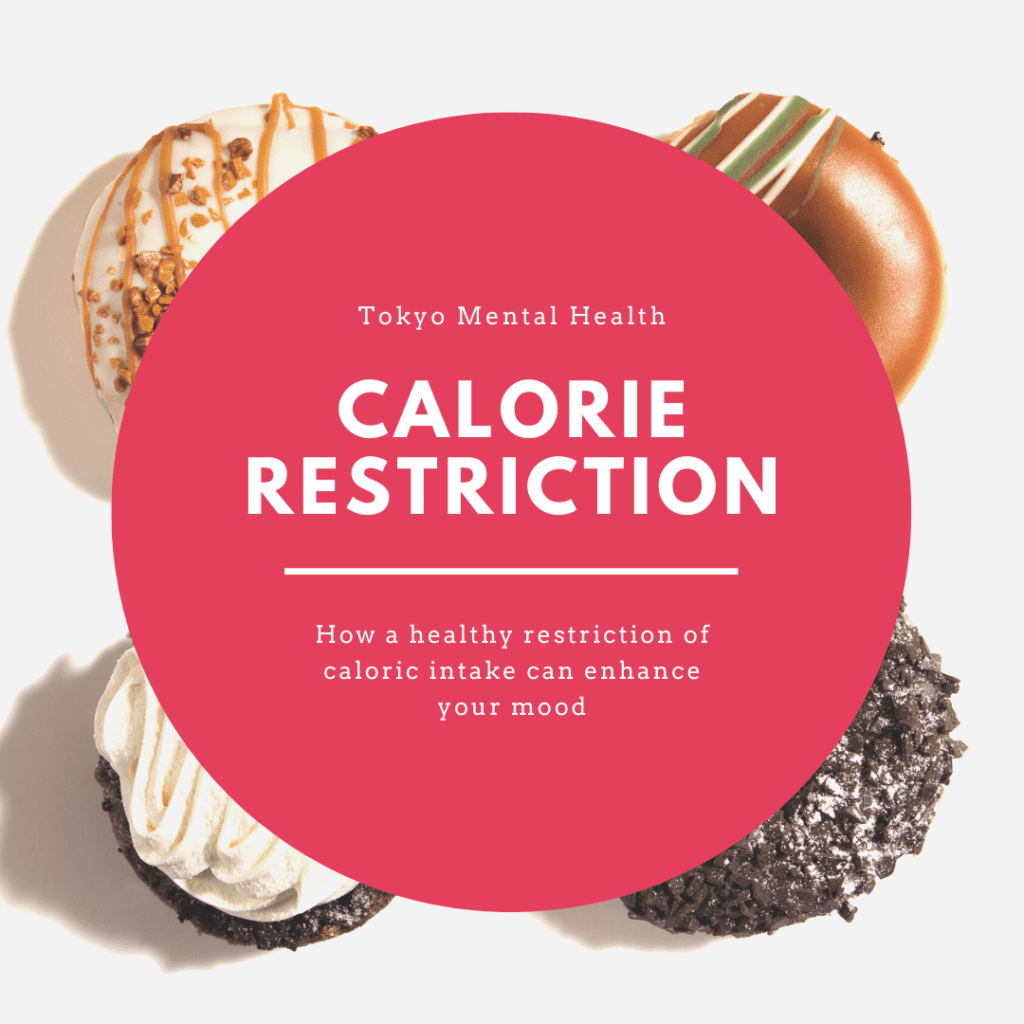Author: Mari Sone, BA
(DISCLAIMER: This blog article does not endorse disordered eating behaviors. If you suspect that you or your loved one may be suffering from an eating disorder, please contact us at [email protected])

“If you eat less, you feel happier.” How odd does that sound?
A lot of people expect the restriction of food intake to be stressful and irritating, because of the uncomfortable sense of saving yourself for another bite. But this statement, eating less and feeling happier, does seem to be true. According to a large body of scientific research, restricting calories triggers several positive effects on our body, and this effect has been evidenced in not just a few, but in many studies in both animals and humans (for a broad review of this literature see Manchishi et al, 2018 and Zhang et all, 2015). The positive impacts of restricting calories include longevity, prevention of certain diseases including neurodegenerative diseases and cancers, and surprisingly, improved mood and quality of life (QOL) as well. Let’s explore the mysteries of this counterintuitive idea.
What is calorie restriction?
Calorie restriction generally refers to a 10-30 percent reduction (for humans) in daily calorie intake without falling into malnutrition. It allows you to drink water freely and, unlike fasting which often gets confused with restricting calories, people do not need to have any periods without eating. Duration of the dietary regime varies depending on people, clinical practice, and the study; some practice it for weeks, or some for more than a year.
Does it really improve mood?
Much human calorie restriction research has confirmed the initial evidence for an improvement in mood. For example, a study by Hussin et al. observed that mental tension, confusion, and mood disturbance improved in both calorie restriction and fasting groups more than in the control group. Several other human studies have also supported this evidence for a positive effect on mood and quality of life as well.
Can calorie restriction be used to treat depression?
Some researchers have suggested the possibility of a calorie restriction dietary practice as a novel behavioral intervention for depression. However, it is unlikely that clinicians will be able to recommend this as a single and isolated effective intervention because the effect is too modest for mood symptoms of a severity as those seen in clinical depression. Moreover, the methodological difficulty in appropriately assessing calorie restriction in clinical studies need to establish a valid protocol. The likelihood of calorie restriction becoming an effective alternative to current mainstream evidence-based treatments for depression is low, despite good evidence of its effect on mood.
Why does calorie restriction improve mood?
Researchers have suggested several potential theories as the mechanism behind these counterintuitive benefits of restricting calories. Calorie restriction is reported to have beneficial effects on the brain by triggering physiological changes including neural signaling and molecular pathways. One of the best supported theories is that calorie restriction increases neurogenesis in the hippocampus, which is correlated with depression and seems to be critical for mood. Other theories are supported by evidence of alterations in the state of specific neurotransmitters, changes in neuro inflammation, and changes in other molecular components such as sirtuin or ketones.
Are there any side-effects or risks to restricting calories?
As long as you maintain good nutrition or avoid severe restriction of calories, you are unlikely to experience significant side effects. Clinical calorie restriction studies, which entail nutritional intervention through education or dietary supervision, report no significant side effects. However, there are reports that intense calorie restriction or restriction associated with malnutrition can lead to side effects including irritability and impaired cognitive function. This means that it is important to keep your eye on your nutrition when you try restricting calories or you might experience adverse effects you did not expect.
References
Hussin, N. M., Shahar, S., Teng, N. I. M. F., Ngah, W. Z. W., & Das, S. K. (2013). Efficacy of fasting and calorie restriction (FCR) on mood and depression among ageing men. The Journal of Nutrition, Health & Aging, 17(8), 674–680. https://doi.org/10.1007/s12603-013-0344-9
Manchishi, S. M., Cui, R. J., Zou, X. H., Cheng, Z. Q., & Li, B. jin. (2018). Effect of caloric restriction on depression. Journal of Cellular and Molecular Medicine, 22(5), 2528. https://doi.org/10.1111/jcmm.13418
Teng, N. I. M. F., Shahar, S., Manaf, Z. A., Das, S. K., Taha, C. S. C., & Ngah, W. Z. W. (2011). Efficacy of fasting calorie restriction on quality of life among aging men. Physiology & Behavior, 104(5), 1059–1064. https://doi.org/10.1016/j.physbeh.2011.07.007
Zhang, Y., Liu, C., Zhao, Y., Zhang, X., Li, B., & Cui, R. (2015). The Effects of Calorie Restriction in Depression and Potential Mechanisms. Current Neuropharmacology, 13(4), 536. https://doi.org/10.2174/1570159X13666150326003852
About the Author

Mari is an intern at Tokyo Mental Health. She is a recent graduate of International Christian University in Tokyo and currently works as a research assistant in a psychiatry lab at Tokyo University. She is currently working on a clinical audit on the treatment of depression. Her research focus is in the neuroscientific field.